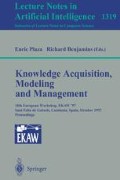Abstract
The paper focuses on the specification of flexible knowledge-based systems. A flexible system is capable of adapting its reasoning to the current problem. Its control is not deterministically defined but dynamically calculated. First, we present how TFL, the TASK formal language, enables to specify such a dynamic control. In TFL, a system is specified in terms of problems, reasoning processes, domain structures, strategies and task-modules Strategies describe heuristics for selecting or configuring the most relevant reasoning process at runtime. All these elements are specified by algebraic data types. For processes, an adaptation of classical data types was needed. Operators inspired from preferential logics were introduced for strategies. Second, we describe how TFL enables to address the problem of verifying the dynamic knowledge base. We show how it can be formally proved that a process is correct with respect to a given problem. To summarize, TFL specifications provide bolh a precise description of the underlying reasoning of flexible systems and a framework for its verification.
Preview
Unable to display preview. Download preview PDF.
References
Andreka, H., Ryan, M. and Schobbens P.-Y. 1994. Laws of Generalised Priority Operators, In International Workshop on Information Systems — Correctness and Reusability (ISCORE'94)
R. Wieringa, R. Feenstra (Eds.), VUA IR-357, World Scientific Publishers.
Aussenac, N., Frontin, J., Soubie J.L. 1991. Evolution dune reprisentattion dcs connaissances pour l'acquisition. In Knowledge Modelling and Expertise Transfert, 21–24, IOS.
Angele J., Decker, S., Perkuhn R., Studer R. 1997. Modeling Problem-solving Methods in NewKARL. In 7th workshop Knowledge Engineering Methods and Languages, KEML 97, Milton Keynes, England.
Benjamins, R. and Pierret-Golbreich, C. 1996. Assumptions of Problem-Solving Methods. Lecture Notes in Artificial Intelligence, 1076, 9th European Knowledge Acquisition Workshop, N. Shadboldt and K. O Hara and G. Schreiber (Ed.), 1–16, Springer-Verlag
Bidoit, M. 1989. PLUSS, un langage pour le développement de spécifications algébriques modulaires. Thése d'Etat, Université Paris Sud.
Bredillet, P., Delouis-Jacob, I., Eyrolles, P., Jehl, O., Krivine J.P., Thiault, P., (1994). The AUSTRAL Expert System for Power Restorationon Distribution Systems, In Fifth Symposium in Intelligent Systems Application to Power Systems (ISAP'94), Montpellier, France
Chandrasekaran, B., Johnson, T. R. and Smith, J. W. 1992. Task-structure analysis for knowledge modelling. Communications of th ACM, 35(9),124–137.
Ermine, J-L. 1993. Génie logiciel et génie cognitif pour les systems à base de connaissances. Lavoisier Ed.
Fensel D. 1995. The Knowledge Acquisition and Representation Language KARL. Boston, Dudreccht, London: Kluwer Academic Press.
Fensel, D. and Groenbaum, R. 1996. MLPM: Defining semantics and Axiomatisation for Specifying the Reasoning Process of Knowledge-based Systems. In 12th European Conference on Artificial Intelligence, Budapest.
Krivine, J. P., & Delouis, I. (1991). Interactive Knowledge-Based System for Assistance in the Analysis and Reinforcement of Power Subtransmission Networks. In Third Symposium on Expert Systems Application to Power Systems, Tokyo, Japon.
Newell, A. (1982). The knowledge level. Artificial Intelligence, 18.
Pierret-Golbreich, C. and Delouis I. 1991. TASK: task centered representation. In 8th Conference of the Society for the Study of Artificial Intelligence and Simulation of Behavior, Steels and Smith Ed., Springer-Verlag.
Pierret-Golbreich, C. 1996. TASK, un environnement pour le dèveloppement de syst`emes à base de connaissances flexibles. Th`ese d'Habilitation à diriger des recherehes. Universitè Paris Sud.
Pierret-Golbreich, C. 1996b. Correctness of Methods w.r.t Problems Specifications, Workshop on Validation Verification and Refinement of Knowledge-based systems of the 12th European Conference on Artificial Intelligence, Wahlster Ed., Wiley & Sons, Ltd.
Pierret-Golbreich, C. and Talon, X. 1996. TFL: an algebraic language to specify the dynamic behaviour of KBS. The Knowledge Engineering Review, Vol 11: 3 253–280, Cambridge Press.
Puerta, A., Agar, J.,Tu, S., and Musen, M. 1992. A multiple method shell for the automatic generation of knowledge acquisition tools. Knowledge Acquisition, 4, 171–196.
Ryan, M. D. 1992. Representing defaults as sentences with reduced priority, In B. Nebel and W. Swartout (Ed.), Third International Conference on Principles of Knowledge Representation and Reasoning (KR'92), Morgan Kaufmann.
Scapin, D.L., Pierret-Golbreich, C. 1990. Towards a method for task description: MAD. In Berlinguet L. and Berthelette D. (Ed.), Work with Display Units 89. 371–380, Elesevier Science Publishers.
Schreiber, Wielinga and Breuker, J. 1993. KADS. A principled Approach to Knowledge-Based Systems Development. Knowledge Based Systems, vol. 11, Academic Press, London.
Steels, L. 1990. Components of expertise. AI Magazine, 28–40
Sebillotte, S. and Fallah, D. 1995. Task description “Resolve the, emergency situation: Fire”
Final Technical report Esprit Project Intuitive P6593.
Talon, X. and Pienet-Golbreich, C., 1996. TASK: from the specification to the implementation. In 8th IEEE International Conference on Tools with Artificial Intelligence, 80–88, IEEE Computer Society Press.
Talon, X. and Pierret-Golbreich, C. 1997. A language to specify strategies for flexible problemsolving. In 7th Knowledge Engineering Methods and Languages Workshop, KEML 97, Milton Keynes, England.
van Harmelen and Balder, 1992. (ML)2, a formal language for KADS conceptual models. Knowledge Acquisition, 4:1, 1992.
Author information
Authors and Affiliations
Editor information
Rights and permissions
Copyright information
© 1997 Springer-Verlag Berlin Heidelberg
About this paper
Cite this paper
Pierret-Golbreich, C., Talon, X. (1997). Specification of flexible knowledge-based systems. In: Plaza, E., Benjamins, R. (eds) Knowledge Acquisition, Modeling and Management. EKAW 1997. Lecture Notes in Computer Science, vol 1319. Springer, Berlin, Heidelberg. https://doi.org/10.1007/BFb0026786
Download citation
DOI: https://doi.org/10.1007/BFb0026786
Published:
Publisher Name: Springer, Berlin, Heidelberg
Print ISBN: 978-3-540-63592-5
Online ISBN: 978-3-540-69606-3
eBook Packages: Springer Book Archive

